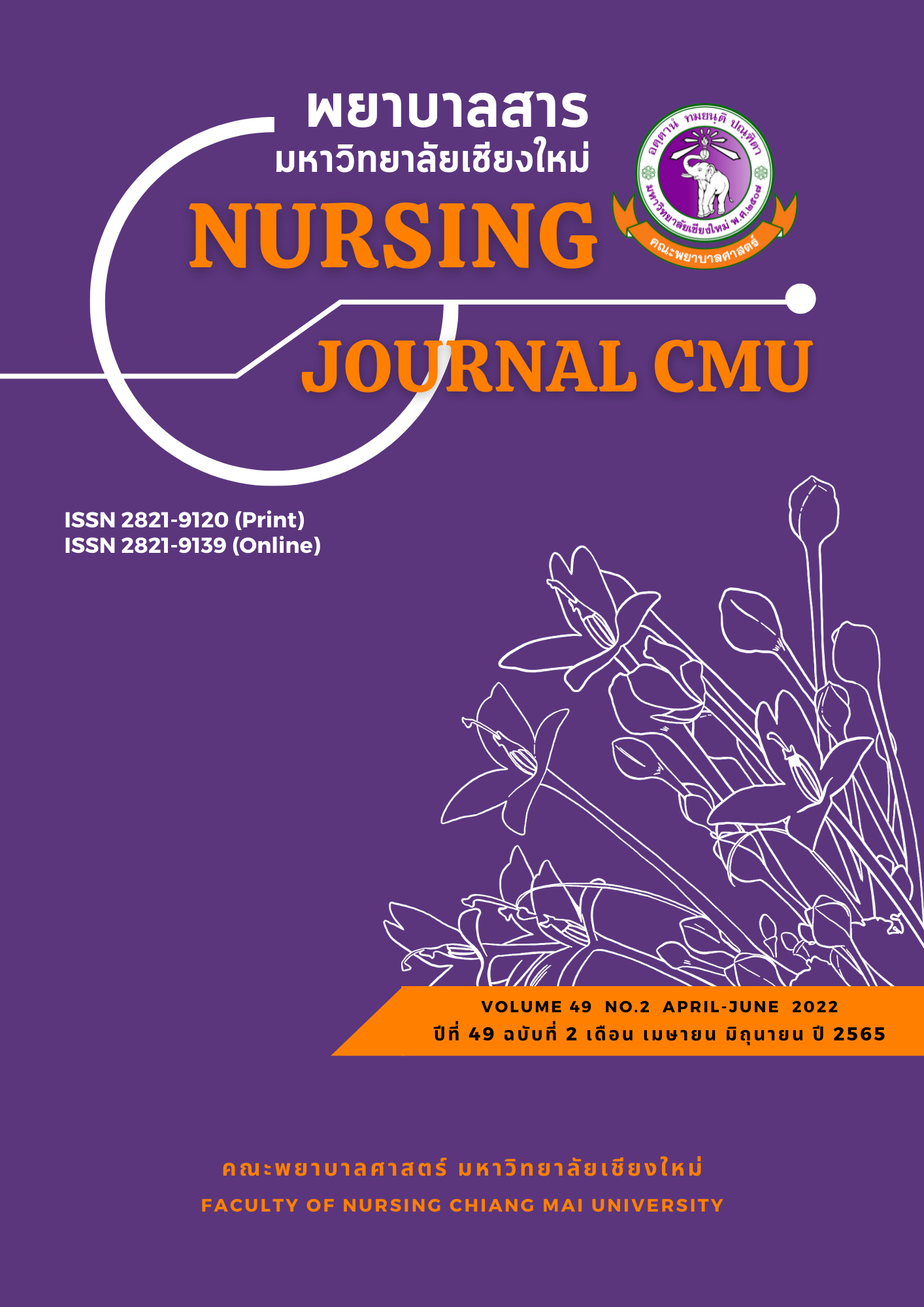การยอมรับวัคซีนโควิด 19 จากมุมมองของประชาชนในพื้นที่ภาคเหนือตอนบน: การวิจัยแบบผสมผสาน
คำสำคัญ:
การยอมรับวัคซีน, การวิจัยแบบผสมผสาน, วัคซีนโควิด 19, แบบแผนความเชื่อด้านสุขภาพบทคัดย่อ
การศึกษาวิจัยแบบผสมผสานครั้งนี้ มีวัตถุประสงค์เพื่อประเมินการยอมรับวัคซีนป้องกันโรคโควิด 19 และศึกษาปัจจัยที่เกี่ยวข้องกับการยอมรับวัคซีนของประชาชน โดยในขั้นตอนการวิจัยเชิงปริมาณ กลุ่มตัวอย่างประกอบด้วยประชาชนอายุ 18 ปีขึ้นไป จำนวน 2,200 คน คัดเลือกกลุ่มตัวอย่างจาก 25 อำเภอในจังหวัดเชียงใหม่ โดยใช้วิธีการสุ่มแบบกลุ่มหลายขั้นตอน เก็บรวบรวมข้อมูลโดยใช้แบบสอบถามซึ่งสร้างขึ้นตามแนวคิดและองค์ประกอบของแบบแผนความเชื่อด้านสุขภาพ วิเคราะห์ปัจจัยที่เกี่ยวข้องกับการยอมรับวัคซีนโควิด 19 โดยใช้ Binary logistic regression analysis การรวบรวมข้อมูลเชิงคุณภาพ คัดเลือกกลุ่มตัวอย่างแบบเฉพาะเจาะจง จากผู้ที่อายุตั้งแต่ 18 ปี ขึ้นไป ได้กลุ่มตัวอย่างจำนวน 40 คน เก็บรวบรวมข้อมูลโดยการสนทนากลุ่ม วิเคราะห์ข้อมูลโดยใช้การวิเคราะห์เนื้อหา
ผลการศึกษาพบว่าอัตราการยอมรับวัคซีนป้องกันโรคโควิด 19 ของประชาชนคิดเป็นร้อยละ 41.1
ปัจจัยที่เกี่ยวข้องกับการยอมรับวัคซีนของประชาชน ได้แก่ ลักษณะทางประชากรและสังคมของบุคคล ได้แก่ ระดับการศึกษา สถานภาพการจ้างงาน ประวัติการได้รับวัคซีนไข้หวัดใหญ่ ความรู้เกี่ยวกับโรคโควิด 19 การรับรู้ความเสี่ยงต่อการติดเชื้อ การรับรู้ประโยชน์ของการฉีดวัคซีน การกระตุ้นให้เกิดการปฏิบัติ เช่น การสนับสนุนจากคนในชุมชน และการได้รับคำแนะนำจากบุคลากรทางการแพทย์ ผลจากการสนทนากลุ่มพบว่าการตัดสินใจยอมรับวัคซีนป้องกันโรคโควิด 19 ของกลุ่มตัวอย่างขึ้นกับหลายปัจจัยได้แก่ ความเสี่ยงต่อการติดเชื้อ ประสิทธิผลและความปลอดภัยของวัคซีน การได้รับข้อมูลและแหล่งของข้อมูล และอิทธิพลจากบุคคลอื่น
ผลการวิจัย เน้นให้เห็นถึงความสำคัญของการพิจารณาและเข้าใจปัจจัยที่มีผลต่อการตัดสินใจฉีดวัคซีนของประชาชน เพื่อที่จะพัฒนาโครงการด้านสาธารณสุขที่มีประสิทธิภาพ ที่จะช่วยเพิ่มการรับบริการในการฉีดวัคซีนป้องกันโรคโควิด 19
เอกสารอ้างอิง
Alimohamadi Y, Sepandi M. (2019). Considering the design effect in cluster sampling. Journal of Cardiovascular and Thoracic Research, 11(1), 78.
Al-Mohaithef, M, Padhi, B. K. (2020). Determinants of COVID-19 vaccine acceptancein Saudi Arabia: A web-based national survey. Journal of Multidisciplinary Healthcare, 13, 1657-1663.
Al-Metwali, B. Z., Al-Jumaili, A. A., Al-Alag, Z. A., Sorofman, B. (2021). Exploring the acceptance of COVID-19 vaccine among healthcare workers and general population using health belief model. Journal of Evaluation in Clinical Practice, 27, 1112–1122.
Becker, M. H. (1974). The Health Belief Model and preventive health behavior. New Jersey: Charles B. Slack
Graneheim, U. H., & Lundman, B. Qualitative content analysis in nursing research: Concepts,procedures and measures to achieve trustworthiness. (2004). Nurse Education Today, 24,105–112.
Kelly, B. J., Southwell, B. G., McCormack, L. A., Bann, C. M., MacDonald, P. D. M., Frasier, A. M., …. Squiers, L. B. (2021). Predictors of willingness to get a COVID-19 vaccine in the U.S. BMC Infectious Disease, 21, 338.
Kitro, A., Sirikul, W., Piankusol, C., Rirermsoonthorn, P., Seesen, M., Wangsan, K., ... Sapbamrer, R. (2021). Acceptance, attitude, and factors affecting the intention to accept COVID-19 vaccine among Thai people and expatriates living in Thailand. Vaccine, 39, 7554–7561.
Kourlaba, G., Kourkouni, E.,Maistreli, S., Tsopela, C.G., Molocha, N. M., Triantafyllou. C….Zaoutis, T. E. (2021). Willingness of Greek general population to get a COVID-19 vaccine. Global Health Research and Policy, 6, 3.
Lazarus, J. V., Ratzan, S. C., Palayew, A., Gostin, L.O., Larson, H. J. Rabin, K., ... El-Mohandes, A. A. (2021). Global survey of potential acceptance of a COVID-19 vaccine. Nature Medicine, 27, 225–228.
Mahmud, S., Mohsin, M., Khan, I. A, Mian, A. U., Zaman, M. A. (2021). Knowledge, beliefs, attitudes and perceived risk about COVID-19 vaccine and determinants of COVID-19 vaccine acceptance in Bangladesh. PLoS One, 16(9): e0257096.
Ritchie, H., Beltekian, D. (2021). Mortality risk of COVID-19. Retrieved from https://ourworldindata.org/mortality-risk-covid.
Sherman, S. M., Smith, L. E., Sim, J., Amlôt, R., Cutts, M., Dasch, H., ... Sevdalis, N. (2021).Acceptability COVID-19 vaccination intention in the UK: Results from the COVID-19 vaccination study (CoVAccS), a nationally representative cross-sectional survey. Human Vaccines & immunotherapeutics, 17(6), 1612-1621.
Shmueli, L. (2021). Predicting intention to receive COVID-19 vaccine among the general population using the health belief model and the theory of planned behavior model, BMC Public Health, 21, 804.
Singh, C., Naik, B. N., Pandey, S., Biswas, B., Pati, B. K., Verma, M., … Singh, P. K. (2021). Effectiveness of COVID-19 vaccine in preventing infection and disease severity: a case-control study from an Eastern State of India. Epidemiology and Infection, 149, e224,1-9.
Solís Arce, J. S., Warren, S. S, Meriggi , N. F., Scacco, A., McMurry , N., Voors, M., … Omer, S. B. (2021). COVID-19 vaccine acceptance and hesitancy in low- and middle-incomecountries. Nature Medicine, 27, 1385–1394.
Tran, V. D., Pak, T. V., Gribkova, E. I., Galkina, G. A., Loskutova, E. E., Dorofeeva, V. V., ... Pham, S. B. (2021). Determinants of COVID-19 vaccine acceptance in a high infection-rate country: A cross-sectional study in Russia. Pharmacy Practice, 19(1), 2276.
Wayne, W. D. (1995). Biostatistics: A foundation of analysis in the health science (6th ed.). New York: John Wiley & Sons, Inc.
Wilder-Smith, A. (2021). What is the vaccine effect on reducing transmission in the context of the SARS-CoV-2 delta variant? Lancet Infectious Disease., 22(2), 152-153.
Wong, L. P, Alias H, Wong P. F., Lee, H. Y, AbuBakar, S. (2020). The use of the health belief model to assess predictors of intent to receive the COVID-19 vaccine and willingness to pay. Human vaccines & Immunotherapeutics, 16, 2204– 2214.
Wong, M. C. S., Wong, E. L.Y., Huang, J., Cheung, A. W. L, Law, K., Chong, M. K. C., ...Chan, P. K. S. (2021). Acceptance of the COVID-19 vaccine based on the health belief model: A population-based survey in Hong Kong. Vaccine, 39, 1148–1156.
World Health Organization. (2022a). WHO coronavirus (COVID-19) dashboard. Retrieved from https://covid19.who.int/ (accessed on 5 2022).
World Health Organization. (2022b). Thailand-WHO coronavirus (COVID-19) dashboard.Retrieved from https://covid19.who.int/region/searo/country/th
World Health Organization. (2022c). Tracking SARS-CoV-2 variants. Retrieved from https://www.who.int/activities/tracking-SARS-CoV-2-variants
World Health Organization (2022d). COVID-19 advice for the public: Getting vaccinated. Retrieved from https://www.who.int/emergencies/diseases/novel-coronavirus-2019/covid-19-vaccines/advice
World Health Organization. (2022e). Strategy to achieve global Covid-19 vaccination by mid-2022. Retrieved from https://cdn.who.int/media/docs/default-ource/immunization/covid-19/strategy-to-achieve-global-covid-19-vaccination-by-mid-2022.pdf.
ดาวน์โหลด
เผยแพร่แล้ว
รูปแบบการอ้างอิง
ฉบับ
ประเภทบทความ
สัญญาอนุญาต
ลิขสิทธิ์ (c) 2022 พยาบาลสาร

อนุญาตภายใต้เงื่อนไข Creative Commons Attribution-NonCommercial-NoDerivatives 4.0 International License.
บทความที่ได้รับการตีพิมพ์เป็นลิขสิทธิ์ของวารสารพยาบาลสาร
ข้อความที่ปรากฏในบทความแต่ละเรื่องในวารสารวิชาการเล่มนี้เป็นความคิดเห็นส่วนตัวของผู้เขียนแต่ละท่านไม่เกี่ยวข้องกับมหาวิทยาลัยเชียงใหม่ และคณาจารย์ท่านอื่นๆในมหาวิทยาลัยฯ แต่อย่างใด ความรับผิดชอบองค์ประกอบทั้งหมดของบทความแต่ละเรื่องเป็นของผู้เขียนแต่ละท่าน หากมีความผิดพลาดใด ๆ ผู้เขียนแต่ละท่านจะรับผิดชอบบทความของตนเองแต่ผู้เดียว






